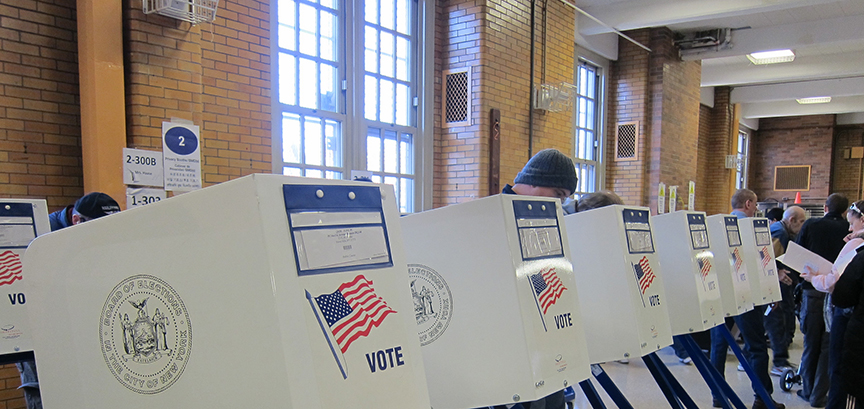One hundred and fifteen statewide ballot measures will appear on November 3, 2020, ballots in 32 states, barring further court-ordered changes.
Together with eight pre-November ballot measures, 123 statewide measures will go before voters in 2020. This is 29% less than the average of 173 statewide measures in even-numbered years from 2010 through 2018.
Forty-three of the 2020 statewide measures were put on the ballot through citizen-initiated signature petition drives. There were an average of 59 citizen-initiated measures in each even-numbered year from 2010 through 2018. In 2016 and 2018, there were spikes in citizen initiative activity, with 76 and 68 measures respectively. There were 40 citizen-initiated measures in 2014.
From 1980 through 2014, an average of 54 citizen-initiated measures appeared on the ballot during even-numbered years. From 2008 through 2014, this average decreased to 49.
State legislatures referred 79 measures to the ballot. On average from 2010 through 2018, state legislatures referred 109 measures to the ballot.
There was one automatic referral in Iowa.
Notable topics and trends
Forty-three (37%) of the Nov. 3 measures are on the topics of election policy, marijuana policy, or taxes.
Eighteen measures in 14 states concern election policy, including campaign finance, election dates, election systems, redistricting, suffrage, and term limits.
Voters in five states will decide ballot measures changing their election systems for congressional, state legislative, and statewide offices. Alaska and Massachusetts voters will decide ranked-choice voting initiatives. Alaska’s measure would also make Alaska the first state to adopt top-four primary elections. Courts removed top-four primary and ranked-choice voting general election initiatives similar to the measure in Alaska from the ballot in Arkansas and North Dakota.
Florida voters will decide an initiative that would replace the state’s closed primary elections with top-two open primaries for state offices. Colorado voters will be the first to weigh in on the National Popular Vote Interstate Compact (NPVIC).
Voters in Missouri, New Jersey, and Virginia will decide redistricting measures.
Voters in Alabama, Colorado, and Florida will decide measures designed to change existing constitutional language providing the right to vote to say “only a citizen of the United States,” rather than “every citizen of the United States,” who is 18 years old or older has the right to vote.
Voters in California will decide whether to allow 17-year-olds to vote in primary and special elections if they will be 18 by the next general election. Voters will also decide whether to allow convicted felons who are on parole the ability to vote.
Voters in Arizona, Montana, New Jersey, and South Dakota will vote on whether to legalize recreational marijuana. Voters in South Dakota and Mississippi will decide medical marijuana initiatives. South Dakota is the first state to vote on both recreational and medical marijuana measures at the same election.
Voters in 12 states will vote on 19 tax-related ballot measures. Ten of the measures address taxes on properties, three are related to income tax rates, two address tobacco taxes, one addresses business-related taxes, one addresses sales tax rates, one addresses fees and surcharges, and one is related to tax-increment financing (TIF).
Campaign finance
Committees registered to support or oppose the 124 statewide measures certified for 2020 ballots reported a combined $565.3 million in contributions and $224.9 million in expenditures.
The following five states have the most ballot measure campaign finance activity reported so far:
• California – $316.8 million in contributions
• Illinois – $80.4 million in contributions
• Florida – $28.4 million in contributions
• Colorado – $23.4 million in contributions
• Oregon – $14.1 million in contributions
The most expensive ballot measure of the year, California Proposition 22, is also the most expensive measure in California’s history. The support campaign has received record-breaking total contributions from multiple app-based driver companies, including Lyft, Uber, and Doordash.
Unique measures
Oregon could become the first state to create a program for the legal use of psilocybin mushrooms and to decriminalize all drugs.
Mississippi voters will decide on a new state flag design to replace its last flag featuring the Confederate battle flag, and Rhode Island voters will decide whether or not to remove the words “Providence Plantations” from the state’s official name. Voters in both states decided in favor of the status quo on these issues in 2001 and 2010, respectively.
Get more details and analysis in the September edition of the State Ballot Measure Monthly. The edition covers the final certifications of 2020; the measures that were removed fro the ballot since mid-August; and more analysis of trends, notable topics, and unique measures.
Subscribe to Ballotpedia’s newsletters to see upcoming analysis of the 2020 measures, including our comprehensive reports on signature petition costs, campaign finance, and ballot language readability.
Additional reading:
2020 ballot measures
Ballotpedia.org


